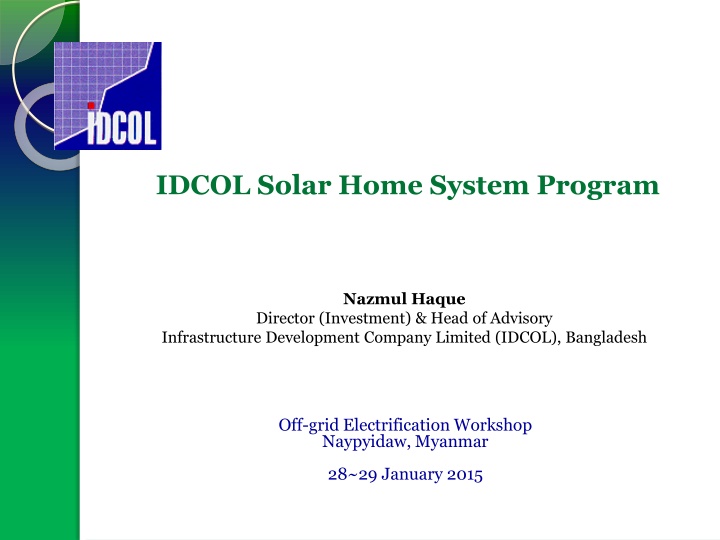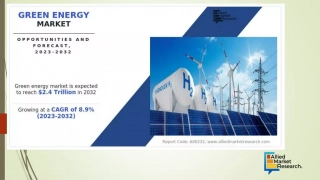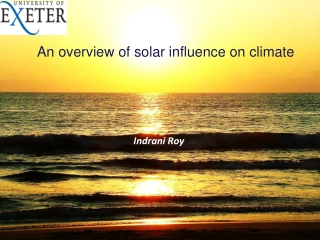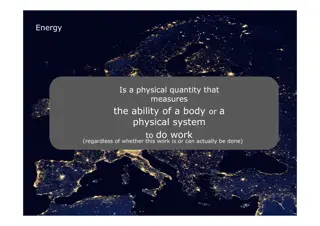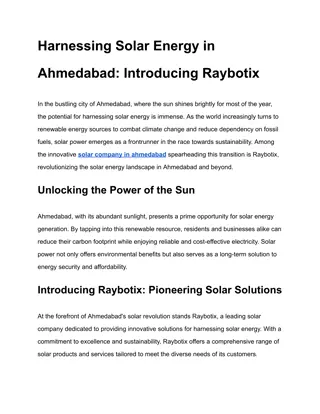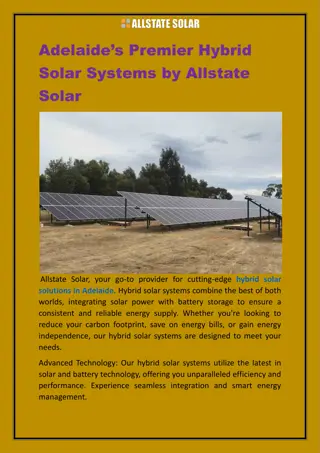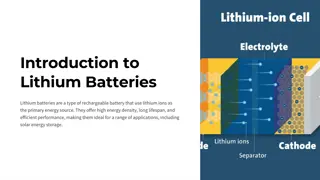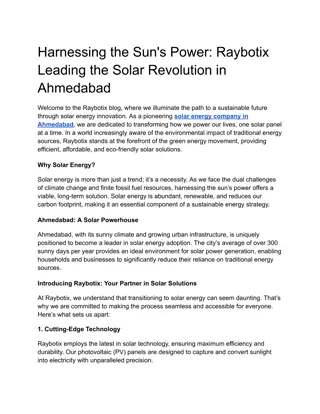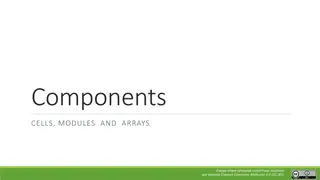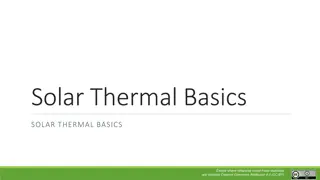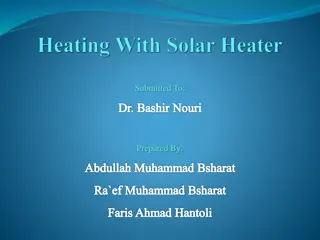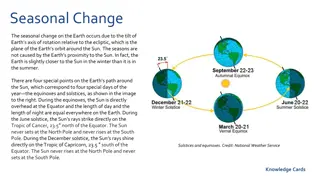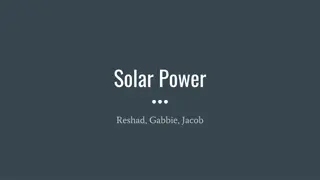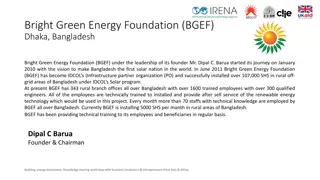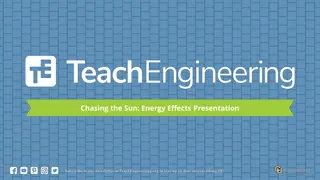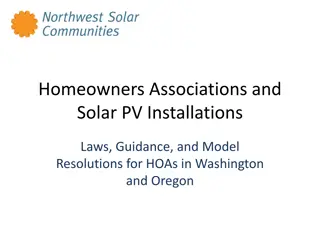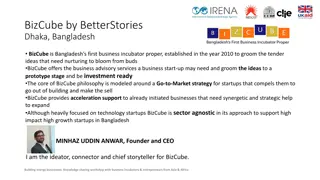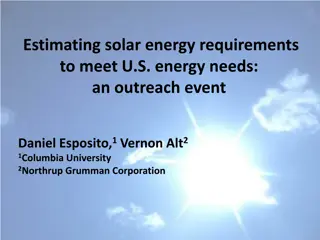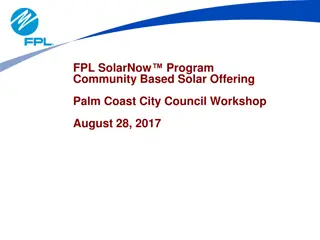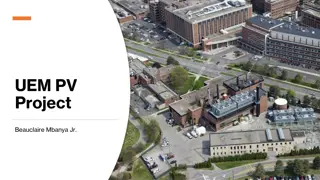IDCOL Solar Home System Program in Bangladesh: Addressing Energy Access Challenges
This article highlights the IDCOL Solar Home System Program in Bangladesh, a state-owned initiative aimed at providing off-grid electrification to rural households. The program's achievements, targets, and challenges related to renewable energy adoption are discussed. Through a structured approach involving technical standards, financing models, and partnerships, IDCOL is making significant strides in promoting sustainable energy solutions for underserved communities.
Download Presentation

Please find below an Image/Link to download the presentation.
The content on the website is provided AS IS for your information and personal use only. It may not be sold, licensed, or shared on other websites without obtaining consent from the author.If you encounter any issues during the download, it is possible that the publisher has removed the file from their server.
You are allowed to download the files provided on this website for personal or commercial use, subject to the condition that they are used lawfully. All files are the property of their respective owners.
The content on the website is provided AS IS for your information and personal use only. It may not be sold, licensed, or shared on other websites without obtaining consent from the author.
E N D
Presentation Transcript
IDCOL Solar Home System Program Nazmul Haque Director (Investment) & Head of Advisory Infrastructure Development Company Limited (IDCOL), Bangladesh Off-grid Electrification Workshop Naypyidaw, Myanmar 28~29 January 2015
Bangladesh: Key Energy Outlook While significant progress is being made every year, still more than 40% of the country s nearly 160 million people do not have access to grid electricity. 15 million rural households do not have access to electricity and still use kerosene lamps for lighting their homes after dark. The Government has a vision to ensure access to electricity for all by 2021. Government also has a target to generate 5% of total electricity using RE by 2015 and 10% by 2030. While the country s renewable energy (especially solar) potential appears to be bright, ensuring affordable electricity for the poor (About 32% of the country s population are below the poverty line and about 18% are ultra poor) using capital intensive renewable energy technologies remains a big challenge.
IDCOL Solar Home System (SHS) Program IDCOL is a state-owned development financial institution dedicated to promote/finance infrastructure and renewable energy projects in Bangladesh. IDCOL SHS Program: Started in 2003 with funding support from the World Bank and GEF Initial Target: 50,000 SHSs by June 2008 Revised Target: 1 million SHSs by 2012 New Target: 6 million SHSs by 2017
Key SHS Statistics Program Achievement Number of Beneficiaries : : 3.45 million till Dec 14 15.5 million people (9% of total population) About 141 MW 207,000 ton/year 488,913 ton/year 75,000 people USD 600 million Power Generation Fossil Fuel Saving CO2 reduction Job Creation IDCOL Investment : : : : :
Program Structure Technical Standards Committee Provides approval Suppliers Seeks approval Supply Equipment Pay for Equipment Provide grant & loan Applies PO Selection Committee IDCOL NGO/PO Seeks grant & loan Select POs Sells SHS & provide service Pay down- payment & installment Operations Committee Government Household Development Partners
Mode of Financing: an Example (a) Market Price of a 20Wp SHS USD 193 (b) Buy-down grant USD 20 (c) System Price for Household [(a)-(b)] USD 173 (d) Down payment from household to PO [10% of (c)] USD 17 (e) PO loan to household [(c)-(d)] USD 156 Loan Tenor Interest Rate Monthly Installment Amount (f) IDCOL Refinance [70%~80% of (e)] Loan Tenor Interest Rate 3 years 16% p.a. USD 5.40 USD 109 ~ 125 5~7 years 6~9% p.a.
Key Program Features Output based Subsidy and Credit Support: IDCOL checks subsidy and refinancing eligibility & conducts random physical verification POs install SHSs as per IDCOL Specification, collect down- payment and extend microcredit POs seek subsidy and refinancing for installed SHSs and upload household information in database IDCOL disburses subsidy and refinancing within 21 business days
Key Program Features Targeted Subsidy with More for the Poor: As grid electricity is already subsidized, the SHS Program focuses only the off-grid areas to avoid duplication of subsidy schemes; Initial range of SHSs supported was 30~130wp, however, later 10~20wp was also introduced to serve the lower income segment. Fixed subsidy for all system sizes, meaning a larger percentage of subsidy for smaller systems usually availed by the poorer segment of the society.
Key Program Features Superior Quality Control and After Sales Services: Only TSC approved equipment and suppliers are eligible to supply. All suppliers are required to provide 20-year warranty for the panel, 5-year warranty for battery and 3-year for the charge controller. POs provide minimum 3-year free after sales service and enter into yearly maintenance agreements with households afterwards. 150 quality inspectors of IDCOL monitor the quality of SHS components and after sales service of POs from 12 regional offices of IDCOL. IDCOL officials and independent technical auditors conduct random re-verification of systems. A dedicated call centre at IDCOL Head Office lodges customer complains and mitigate the same.
Key Program Features Price Determination by the Market: Multiple suppliers for each SHS component allow POs to procure SHSs at competitive prices. Presence of multiple POs ensures healthy competition and customers are free to purchase from their chosen PO based on price and quality of service. Development of Domestic Support Industries: Fiscal support by the government as well as the semi-concessional credit facilities offered by IDCOL to local support industries encourages new domestic manufacturers, ensuring smooth supply at one of the lowest prices in the world
A Sustainable Financing Structure Phased-out Subsidy : 2003 2004~5 2006~7 2008~9 2010~11 2012 2013~14 Capital Buy down Grant Institutional Development Grant $70 $55 $40 $40 $25 $25 $20* $20 $15 $10 $5 $3 - - *for small SHS (up to 30 wp) only Concessionary to Semi-Commercial Credit: 2003~8 2009 2010 2011 2012~15 Loan Tenor 10 yrs 6-10 yrs 6-8 yrs 6-8 yrs 5-7 yrs Interest Rate 6% 6%-8% 6%-8% 6%-8% 6%-9% % of Loan Refinanced 80% 80% 80% 80% 70%-80%
Key Success Factors Cost-efficient standardized technical design Development of local support industries Innovative financing structure Financial contribution of all parties Price Bangladesh s micro-finance experience determination by the market Support from GoB and development partners Superior quality control & after sales service Sustainable business model
Major Challenges Low collection efficiency in some areas due to political instability and inefficiency of partner organizations Prevalence of low cost and low quality SHS outside the program market Lack of the accountability of the suppliers Expansion of grid area
Can IDCOL SHS Program be Replicated in Myanmar? Common Market Features What to do? Large off-grid area Feasibility study and awareness campaigns Dispersed nature of rural population Sustainable financial model including smart subsidy planning Expensive grid expansion due to difficult topography Cost efficient technical design Unjustified grid expansion due to low rural demand Development of local support industries Adequate solar irradiation Proper quality control and after sales service arrangements Presence of NGOs and MFIs Establishment of a dedicated company Stable GDP growth outlook
Advisory Services from IDCOL Knowledge support provided to a number of African countries for successful program replication
Thank You Q & A Infrastructure Development Company Limited (IDCOL) UTC Building (16th Floor), 8 Panthapath, Dhaka 1215 Phone: +880-2-9103883, +880-1711828373 E-mail: nhaque@idcol.org www.idcol.org
